The Murdock 3D Printing Lab has advanced 3D printers for medical and biomechanical modeling, fine details, and high-performance materials. CNC waterjet cutting and low force axial-torsion testing equipment are also available.
Shop access
What do I need to do before using the Murdock 3D Printing Lab?
- Register for ME CORAL with your Worktag, course, or other billing info. All users must register.
- Attend in-person shop safety training. Contact murdock3d@uw.edu to schedule training.
- After attending the in-person training complete the following:
Rates
Some equipment has hourly rates to use it, and 3D printer resin is charged for the volume used. To receive a quote/budgetary estimate for a 3D print, please email murdock3d@uw.edu with a 3D model file, dimensions of your model so staff can confirm proper scaling, and a description of the material(s) you’re interested in using.
| Category | Rate Base | Internal Rate | External Rate | Outside Academic Rate |
| Stratasys J750 resin | gram | $1.07 | $7.01 | $1.23 |
| Carbon M1 resin | mL | $0.78 | $6.68 | $0.90 |
| ProtoMAX waterjet | hour | $49.08 | $114.54 | $56.74 |
| Instron 6844 | hour | $44.90 | $109.70 | $51.90 |
| DMA 3200 | hour | $45.90 | $110.86 | $53.06 |
| Lab engineer | hour | $80.17 | $150.48 | $92.68 |
Hours
The Murdock 3D printing lab is typically staffed Monday through Friday from 9 a.m. to 5 p.m. and is accessible by appointment only. Availability varies depending on scheduled lab classes.
Scheduling
Reserve equipment in CORAL before using it, even if there is not a rate associated with it. Please email murdock3d@uw.edu to schedule training before using equipment for the first time.
Equipment
PolyJet technology enables 3D printing of multiple materials at the same time, and the mixing of more than one resin to create "digital materials" with unique properties. Single parts can have both rigid and flexible elements, materials of varying durometer as soft as 27A, and even multiple colors. This printer can also print optically clear material, simulate the properties of human tissue and bone, and model blood vessel models as small as 1 mm in diameter.
Materials typically available include Vero, Agilus30, and SUP706B. Other materials may be made available upon request. Please review the PolyJet material catalog for J750-compatible materials.
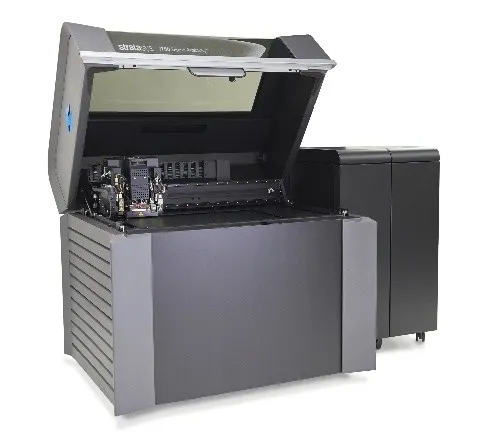
Specifications
- Build area of 490 mm by 390 mm by 200 mm
- Layer height of 0.014 mm or 0.027 mm
- Accuracy of 0.1 to 0.2 mm depending on model size
- Up to 6 model materials + 1 support material printed simultaneously
- PANTONE validated color matching
- WaterJet and BVCA support removal devices available
Please review the PolyJet design guide to learn how to prepare your design for the J750 DA printer. To schedule a time to print, email murdock3d@uw.edu with a 3D model file, dimensions of your model so staff can confirm proper scaling, and a description of the material(s) you’re interested in using.
Engineering-grade single material resin printing using Carbon’s Digital Light Synthesis (DLS) technology, with quality suitable for prototyping and production parts. This printer produces isotropic parts. Most materials are post-cured in an oven to achieve improved mechanical properties. Please review the Carbon material catalog for more information.
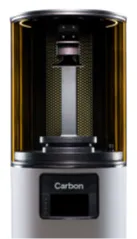
Specifications
- Build area of 141 mm by 79 mm by 326 mm
- Layer height of 0.025 mm, 0.05 mm, or 0.075 mm
- Accuracy of 0.075 mm
- Part cleaning and post-curing equipment available
Please review the Carbon design guide to learn how to prepare your design for the M1 printer. To schedule a time to print, email murdock3d@uw.edu with a 3D model file, dimensions of your model so staff can confirm proper scaling, and a description of the material(s) you’re interested in using.
An entry-level high-temperature FDM printer is available to all users.
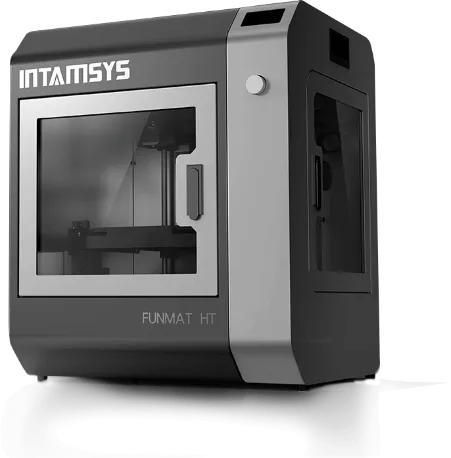
Specifications
- Build area of 260 mm by 260 mm by 260 mm
- Layer height of 0.05 to 0.3 mm
- Uses 1.75 mm filament
- Suitable for PEEK, PEKK, PA, PC, and ABS
- 90 °C heated chamber
- 160 °C build plate
- 450 °C extruder, various nozzle sizes and materials available
Request machine-specific training, then reserve the printer in CORAL before using. There is no charge to use this printer, but you must bring your own filament.
This waterjet abrasive cutter uses high pressure water and a garnet abrasive to make precise cuts in almost any material, including metals, ceramics, glass, stone, leather, wood, composites, plastics, and rubber.
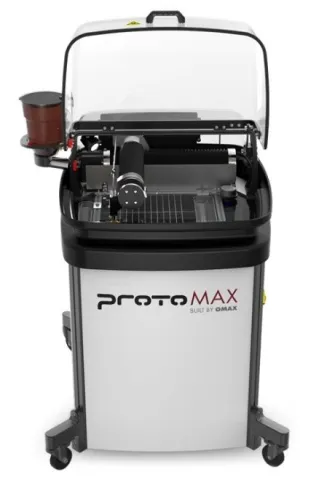
Specifications
- Cutting area of 12 in. by 12 in.
- Cut width of 0.015 in.
- Maximum material thickness of 1 in.
- Three-axis cutting leaves almost no taper on vertical edges
Request machine-specific training, then reserve the waterjet in CORAL before using. Please bring a 2D digital file (DXF or similar) or a dimensioned drawing and your material to cut. All new materials must be approved by a lab engineer. Garnet cutting abrasive will be supplied; please do not bring your own garnet.
This biaxial universal testing machine can perform both axial and torsional mechanical tests. The operating range of this model is best suited to test the mechanical properties of soft and flexible materials, and to test the functionality of end products with screws, threaded fittings, caps, tubing, buttons, and other features or mechanisms which experience low-force and low-torque. For higher-force testing, look for equipment available in the ME Mechanical Test Lab.
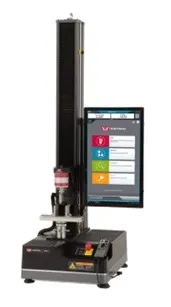
Specifications
- Maximum force of 2 kN in tension or compression
- Maximum torque of 25 Nm
- Static load cells: 50 N, 2 kN
- Biaxial load cells: 450 N + 5 Nm, 1kN + 25 Nm
- Tensile screw grips: max. 46 mm specimen thickness, 42 mm throat depth
- Compression platens: 150 mm and 150 mm diameter
Request machine-specific training, then reserve the universal testing machine in CORAL before using. All new test methods must be approved by a lab engineer.